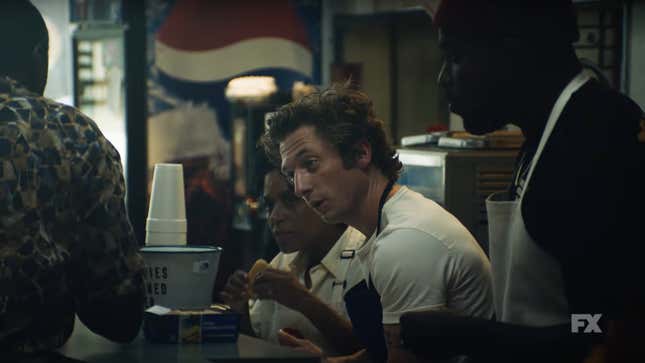
Of all Italian-American regional cultures that have been portrayed in film and TV, Chicago Italian is a combo that is rarely depicted accurately. Chicago Italian just hits differently than New York Italian—and if you know, you know. I don’t make the rules.
For me, I spent my life dining in restaurants across the city that were owned by family or family friends from the old country. But it wasn’t until 10 years ago when I married into (and subsequently divorced out of) a family in its third generation of restaurant ownership that I got to see the underbelly of it all. The Italian family restaurant business had always been romanticized in my adolescent mind for its focus on family bonds and profound pride in serving cuisine born in the owner’s hometown that he left behind for a better life in America.
In FX’s new drama, The Bear creator Christopher Storer ties together Chicago pride, a complicated family dynamic, and the dark side of restaurant life—with a side of giardiniera. Jeremy Allen White’s character, Carmy, returns home to Chicago, ditching his rising fame in New York’s fine dining scene to operate an Italian beef joint owned by his brother, whose recent death would otherwise leave the family business orphaned.
How The Bear brings Chicago to the small screen
From a Malört billboard outside the restaurant to familiar cityscapes to an episode named after iconic Chicago architecture, plus the soundtrack and the forced Bridgeport accents, any and every Chicagoan will get butterflies as the series makes all kinds of nods to the city of broad shoulders and all its grit and glamour.
The Original Beef of Chicagoland is placed in an all-too-familiar setting: a storefront with walls adorned by gallery frames featuring family photos and newspaper clippings, the menu posted above the cash register (where you order), and a back dining room with checkered tablecloths, busted arcade games, and wood paneling. Behind the counter is a crowded, stuffy kitchen filled with sounds of flying expletives and fighting words, as well as a disorganized, dingy office where heads are buried in hands as numbers are crunched.
I can almost smell the scene as shots of seasoned beef butts are being prepped, stuffed with whole garlic cloves and bathing in that mouthwatering Italian beef juice. The food porn alone in a scripted series like this was a pleasant surprise—especially the close-up shots of Allen White’s chopping skills as he prepped homemade giardiniera.
What The Bear gets right about restaurant life
The sullen chef-slash-owner Carmy is running a constant marathon throughout the show juggling plumbing problems, health inspector visits, unpaid bills, staff arguments, vendor deliveries, hungry customers, and of course, cooking. But in The Bear, there’s an added layer of palpable grief weaved into each episode as the fresh wound of his brother’s suicide is wide open for the family.
Anyone watching the show might wonder why this guy would want to take on such a bear of responsibility—especially with his background, talent, and experience. And the depiction couldn’t be more true. In my experience, the restaurant was like a baby, and it was always the number one priority. Each day was dictated by one issue or another, whether it be short staffing, broken freezers, malfunctioning ovens, piled up bills, trips to and from Restaurant Depot, and a rat race that everyone was convinced would pay off—one day.
But perhaps the grief on the show isn’t necessarily due to the tragic loss of a brother, rather, the tragic loss of hopes, dreams, and the life Carmy thought he would have running his family’s restaurant. A life—much like my previous perception of family restaurant culture—that never actually existed, and the harsh reality of never ending demands and money woes.
We all played our role in the business. I learned quickly that my cashier skills were not going to help anyone, and I was better off serving as moral support, food taster, official photographer, and the marketing department. I did, however, bake the cookies we sold for a brief period—until I got sick of it. Carmy and his staff have a fire and a passion for cooking, which is evident in the show, but not for the baptized Italian beefs and mortadella sandwiches on the menu. They would channel all of their love into the dishes they served and devoured with each other. Doughnuts, chocolate cake, short ribs, and risotto were all given ample airtime and I am not one bit upset about it.
That detail in and of itself shows me that this show is a catharsis for its writers, who no doubt have experience as kitchen staff. The best recipes I can remember from the family’s Italian pizzeria were pozole, tamales, and menudo—all off menu and all off-limits to paying customers. Those dishes were crafted by the managers for all the staff, made with 100% love. You can’t put a price on that.
You see, mom and pops like The Original Beef of Chicagoland or the family restaurant I was in take pride in tradition, passing the baton, and honoring parents, grandparents, and even generations before them. The most precious moments can happen inside of a family restaurant, as I witnessed time and time again. My two sons spent their newborn days sleeping in baby carriers on tabletops donned with checkered tablecloths. They took their first steps across the tile floor of the dining room while mom and dad were talking business. They blew out birthday candles and had their first tastes of pizza there. And I’m sure the expectation is that they, too, will run the family business one day—unless they choose a different path.
It’s best summed up in an episode where Cousin aka Richie (Ebon Moss-Bachrach) says, “You let up a little bit, and everything changes. You don’t realize this is a delicate ecosystem and it’s held together by a shared history, and love and respect.”